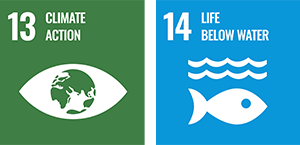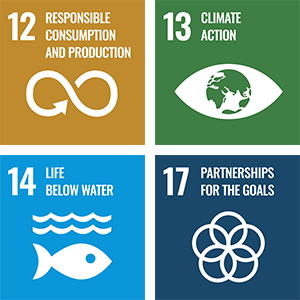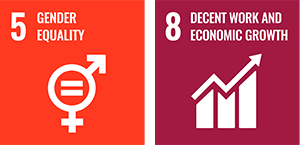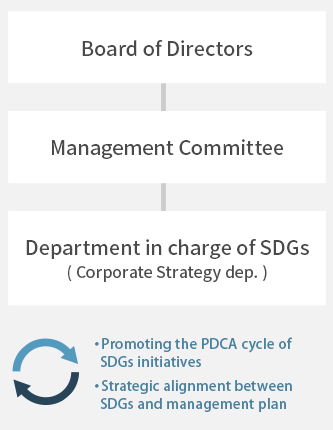Contribute to SDGs
Our Commitment to SDGs
We, Mitsubishi Ore Transport (MOT), as a part of global community, contribute to solving social issues and developing a sustainable society through international maritime transportation.
The 2030 Agenda for Sustainable Development (the 2030 Agenda) is a set of international development goals from 2016 to 2030, which was adopted by the UN Sustainable Development Summit held in September 2015 building on the success of Millennium Development Goals (MDGs).
The 2030 Agenda listed “Sustainable Development Goals” consisting of 17 goals and 169 targets in order to eradicate poverty and realize a sustainable world. The SDGs are universal goals applicable, not only to developing countries but also developed countries, and pledge “Leave no one behind.” through the implementation process.
We make utmost efforts to implement the 2030 Agenda.
Our approach
International maritime transportation by ship, which is our business, accounts for 90% of the world’s total trade volume and plays an important role in supporting the international supply chain, which is indispensable for the development of an affluent society.
It is said that transportation by large bulk carriers emits less carbon dioxide (CO2) per transport volume than air or truck transportation, and is an important social infrastructure for achieving the Sustainable Development Goals (SDGs) advocated by the United Nations.
On the global scale, the total amount of CO2 emitted from international marine transportation is on a scale comparable to the emissions of a single country, and that we have a great responsibility to reduce such emissions.
Contribute to the SDGs through our primary business activities
We are committed to safe voyages and transportation with low environmental impact. Brushing up our business activities directly contributes to the preservation of the global environment as it means preventing marine pollution caused by maritime accidents and reducing fuel consumption for ship repairs. In addition to our daily activities, we will contribute to the SDGs through our primary business activities by replacing our vessels with ones that provide better environmental performance in the mid- to long-term.
Attitude toward SDGs
Our fleet represents less than 0.1% out of tens of thousands of merchant vessels in operation around the world. Although the impact we can make alone may be small, we believe that each step we take is meaningful as we continue our efforts to realize a sustainable society, including environmental conservation, and as we work together with our partners who share our values.
Materiality
We have established the following materiality by considering the relevance and importance of each SDGs to our business activities, with a view to “contributing to solving social issues and realizing a sustainable society through international marine transportation*. In addition, as a foundation for addressing these issues, we will emphasize compliance and corporate ethics, and work to strengthen governance as well.
Materiality
Initiative cases in business activities
Relevant SDGs
I. Ensure the safest maritime transportation
We pursue the industry’s top level of safe navigation and aim to prevent serious marine accidents, thereby saving lives, eliminating marine pollution caused by oil spills, and reducing greenhouse gases generated during idling and repairs due to non-operation of ships.
- Enhancing seafarer training and measures to improve seafarer engagement
- Measures to maintain and upgrade hull conditione
- Effective use of IT and telecommunications technology
- Proper operation and improvement of safety management systems

II. Reduce the environmental impact from shipping
We will replace vessels for decarbonization. As for existing vessels, we will implement fuelsaving measures to reduce GHG emissions.
- As a measure to transition to zero-emission vessels in the future, replacing existing fleet with fuel-efficient or LNG-fueled vessels
- Collaboration with charterers in the areas of fuel savings and optimal operation
- Applying low friction AF paint
- Installing energy-efficient hull equipment
- Scheduled installation and operation of ballast water treatment equipment
- Complying with the ship recycling convention to improve safety during ship scrapping and prevent environmental pollution

III. Establish better work environment
We aim to establish an equal, highly productive, and rewarding work environment regardless of nationality, gender, age, or other factors.
- Work style reforms, including promotion of diversity and continuous operation and improvement of the personnel evaluation system and objective management system

Implementation system

In order to continuously implement materiality initiatives, the Corporate Strategy Department is in charge of promoting the PDCA cycle, and the progress is reported regularly to the Management Committee.
Strategic alignment between SDGs initiatives and management plans is maintained through the organizational structure shown on the right.

